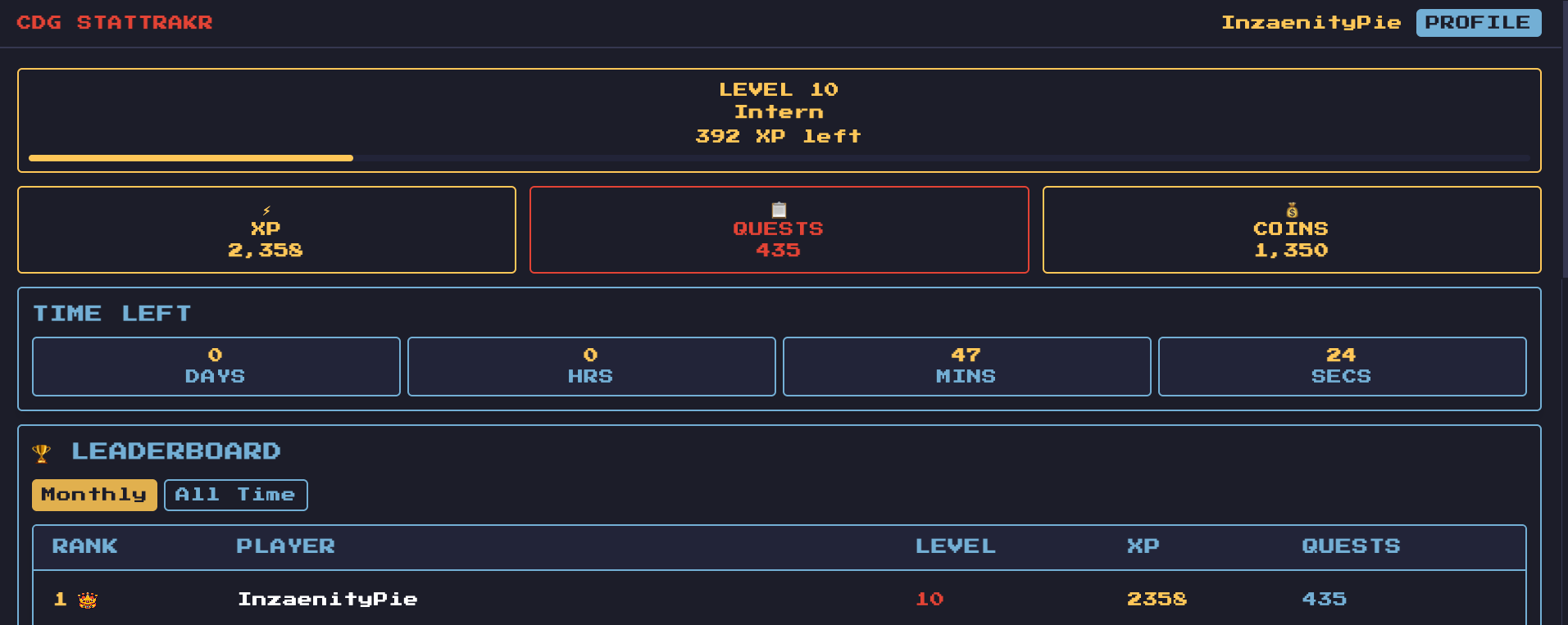Gamifying Developer Productivity: How We Built a GitHub Stat Tracker in 4 Hours

Turning Code Commits into Epic Quests: Our 4-Hour Hackathon Success Story
What happens when you give a group of passionate developers just four hours and complete creative freedom? Magic happens. This year’s Compass Digital Group anniversary celebration proved that some of the best innovations come from tight deadlines and ambitious ideas.
The Challenge: A 4-Hour Innovation Sprint
Our annual celebration took an exciting turn this year with a hackathon format. The rules were simple: four hours, any technology, any idea. The goal? Create something that could genuinely impact our team’s workflow and productivity.
While other teams explored various directions, Reggie and I found ourselves drawn to a problem we’d been discussing for months: how do we make coding more engaging and track our collective progress in a meaningful way?
The Eureka Moment: Gamifying GitHub
The idea hit us like lightning: what if we could transform our daily coding activities into a role-playing game? What if every commit, pull request, and code review became a “quest” that awarded experience points?
We envisioned a system where:
- Commits became mini-quests worth XP
- Pull requests were major achievements
- Code reviews earned collaboration bonuses
- Monthly leaderboards created friendly competition
The concept was ambitious for a four-hour window, but we were determined to make it work.
Building the GitHub Stat Tracker
The Technical Architecture
Our solution centered around GitHub webhooks – the perfect bridge between our development activities and our gamification system. Here’s how we structured it:
Core Components:
- Webhook Listener: Captures real-time GitHub events
- XP Calculator: Assigns points based on activity type and complexity
- Leaderboard Engine: Tracks monthly rankings and achievements
- Dashboard Interface: Displays stats, progress, and team standings
Racing Against the Clock
With only four hours, every decision mattered. We split responsibilities:
- Reggie tackled further research, XP calculation and feature ideas
- I vibe coded the rest
The time pressure actually helped us avoid over-engineering. We built exactly what we needed – no more, no less.
The Psychology of Gamification
What surprised us most wasn’t just the productivity boost – it was how the system changed our team dynamics:
Positive Competition: Instead of individual silos, we developed a culture of healthy competition mixed with collaboration.
Visible Progress: Developers could finally see their daily contributions quantified and celebrated.
Recognition System: Quiet contributors who might not speak up in meetings suddenly had their consistent efforts highlighted.
Monthly Leaderboards: The Game Changer
The monthly leaderboard became our secret weapon. Unlike daily or weekly cycles, the monthly format:
- Sustained Motivation: Long enough to matter, short enough to feel achievable
- Comeback Opportunities: Bad weeks didn’t eliminate entire months
- Natural Reset: Fresh starts every month kept everyone engaged
Technical Deep Dive: The Magic Behind the Scenes
Webhook Integration
// Simplified webhook handler
app.post("/github-webhook", (req, res) => {
const event = req.headers["x-github-event"];
const payload = req.body;
switch (event) {
case "push":
awardCommitXP(payload);
break;
case "pull_request":
awardPRXP(payload);
break;
case "pull_request_review":
awardReviewXP(payload);
break;
}
});Lessons Learned: What We’d Do Differently
The Good
- Simple deployment: Minimal infrastructure meant quick iteration
- Real-time feedback: Instant XP awards kept momentum high
- Team buy-in: Everyone embraced the system from day one
The Improvements
- Anti-gaming measures: Some developers found ways to inflate XP, ahem Owen & Brian
- Quality metrics: We need to balance quantity with code quality
- Team achievements: Individual focus sometimes overshadowed collaboration
Knowledge Sharing
An unexpected benefit emerged: developers started sharing strategies for earning XP, which naturally led to:
- Best practice discussions
- Code review technique improvements
- Collaborative problem-solving approaches
The Hackathon’s Lasting Legacy
What started as a four-hour experiment has become an integral part of our development culture. The GitHub Stat Tracker proves that sometimes the best solutions come from:
- Tight constraints that force creative thinking
- Team collaboration under pressure
- Willingness to experiment with unconventional approaches
Want to Build Your Own?
Inspired to gamify your own development team? Here are our key recommendations:
- Start simple: Basic webhook + XP calculation goes far
- Get team buy-in: Success depends on participation
- Iterate quickly: Listen to feedback and adjust rules
- Balance competition: Ensure healthy rivalry, not toxic behavior
- Celebrate everyone: Find ways to recognize all contribution styles
Conclusion: The Power of Play in Professional Development
The Compass Digital Group GitHub Stat Tracker stands as proof that work doesn’t have to feel like work. By introducing game mechanics into our development process, we’ve created a more engaging, productive, and collaborative environment.
In just four hours, we built something that continues to deliver value months later. But more importantly, we learned that the best productivity tools aren’t always the most sophisticated – sometimes they’re the ones that make people excited to contribute.
Ready to gamify your own development workflow? Connect with us to learn more about implementing GitHub webhook-based stat tracking for your team.